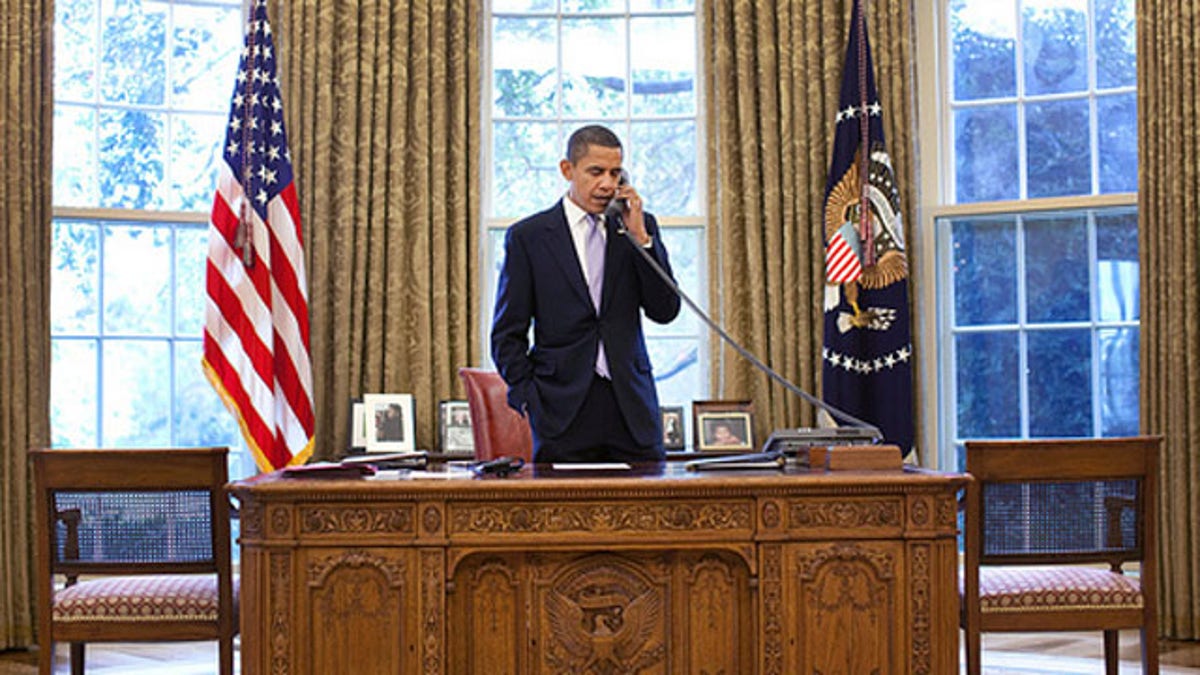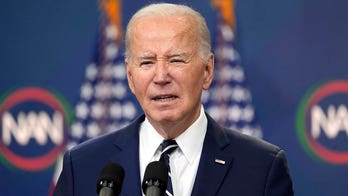
President Obama talks with Hamid Karzai about the Afghanistan election on a phone call from the Oval Office Nov. 2. (White House Photo) (This official White House photograph is being made available only for publication by news organizations and/or for personal use)
The White House on Monday insisted that Hamid Karzai is the "legitimate" leader of the Afghanistan government, dismissing suggestions that the terms of his default victory leave him tarnished in the eyes of the Afghan people and an unsuitable partner for the United States.
The country's election commission on Monday canceled the runoff scheduled for Saturday and declared Karzai the winner after the incumbent's lone challenger, Abdullah Abdullah, dropped out citing concerns over fraud.
Abdullah reiterated his concerns in an interview with Fox News, saying it's a "big question" as to whether a Karzai-led government can "sustain itself for another five years."
But while President Obama said he phoned Karzai to call for a "new chapter" in Afghanistan, the White House claimed the rule of law was followed to a tee in the country's disputed presidential contest and downplayed concerns that Karzai would be seen as the product of a flawed election process.
The reaction is an apparent turnaround toward Karzai, whom the administration suggested had cheated during the August election, and appeared to be an effort at making the best of a bad situation. The administration pledged to hold Karzai's feet to the fire in pursuing an end to rampant government corruption while expressing hope that such goals can be accomplished.
"I think the president, the embassy there and everyone can take heart in the notion that the laws of Afghanistan and the institutions of Afghanistan prevailed," White House Press Secretary Robert Gibbs said. "Obviously, he's the legitimate leader of the country."
Gibbs said the fraudulent ballots that Karzai's supporters were accused of casting were thrown out and investigated, and that little more could have been done to address those concerns.
"I don't think there's any reason to believe that the Afghan people won't think this government is as legitimate as it is," Gibbs said. "I don't know how you can have an election of two candidates if the one who finishes second decides not to participate, even after the laws and institutions of the government threw out what he declared were fraudulent results from the first round."
With casualties mounting in Afghanistan by the day and Obama considering whether to commit up to 40,000 more U.S. troops, White House advisers already had signaled over the weekend that the fizzled runoff would have little bearing on U.S. policy in the war zone.
Obama said Monday that he noted to Karzai that the election had been "messy" but that he was "pleased to say the final outcome was determined by Afghan law."
The U.S. embassy also said in a statement that it looked forward to working with Karzai to support reform and improve security, adding that the commission's decision was "according to its mandate under Afghan law." The British government and the United Nations issued statements of congratulations as well.
But Obama took a stern tone toward Karzai, he said, stressing to the Afghan leader that he wants to see a concrete effort to improve governance, eradicate corruption, accelerate the training of Afghan forces and take advantage of the international interest in his country to press for reforms internally.
"This has to be a point in time in which we begin to write a new chapter," Obama said during an Oval Office photo op with the Swedish Prime Minister Fredrik Reinfeldt. "The proof is not going to be in words -- it's going to be in deeds."
Other lawmakers were less hopeful about the prospects for cleaning up Kabul.
Sen. Russ Feingold, D-Wis., said the muddled outcome of the election only supports his argument that the Obama administration should not send thousands more U.S. troops to the region, as Gen. Stanley McChrystal has requested.
"The deeply flawed election in Afghanistan is just one more reason to question our current misguided strategy, which relies too much on military force and partnerships with corrupt government officials and security forces," Feingold said in a written statement. "Increasing our military footprint will exacerbate the perception among Afghans that the U.S. intends to occupy their country in support of a government many see as illegitimate."
Rep. Joe Sestak, D-Pa., said that the cancellation of the runoff should not affect the administration's war strategy decision -- but that it underscored his belief that the U.S. needs to work more with local officials than the federal government.
"There really was not a partner there," Sestak said. "It just solidifies the correctness of following a counterinsurgency strategy based upon more local autonomous entities."
But Rep. Ike Skelton, D-Mo., chairman of the House Armed Services Committee, held out hope. He said in a statement that despite the "flawed" election, it is "imperative" for Karzai to work to improve governance and eliminate corruption, with the help of the Afghan people.
"Once the people of Afghanistan have decided what is important to them, the U.S. and international community should both help support those efforts and help hold the Karzai government accountable for his promises," Skelton said.
The Associated Press contributed to this report.




